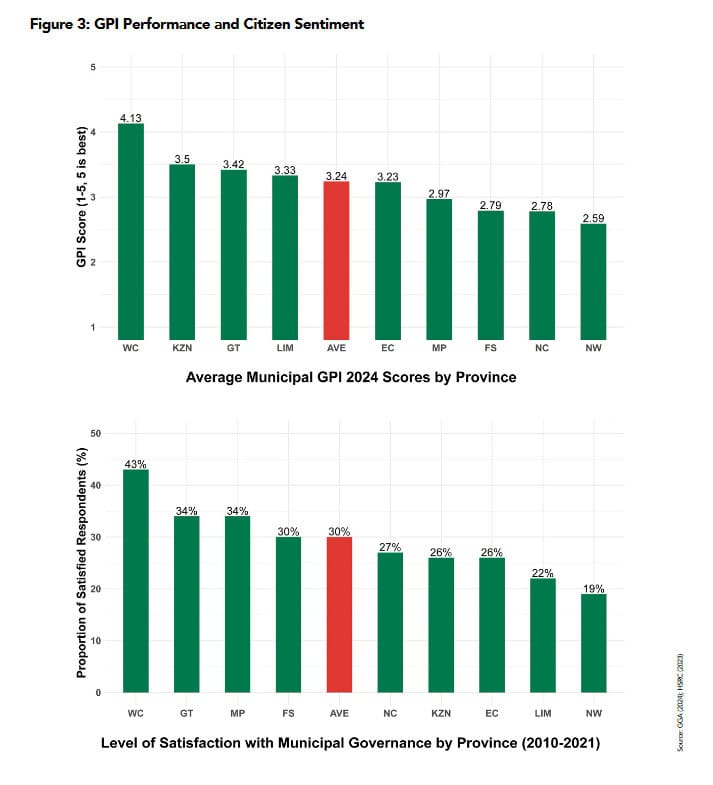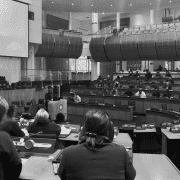|
Getting your Trinity Audio player ready...
|
Image: Flickr/South African Tourism
Good Governance Africa’s (GGA) latest annual Government Performance Index (GPI) was released in March 2024, some three years after the previous edition, and after a lengthy review process. The survey tracks and analyses the state of local governance within local, district, and metropolitan (metro) municipalities across the country, providing “a holistic analysis of the state of local governance within these 257 municipalities,” the report notes.
The GPI, says the organisation, measures how well, or how poorly, individual municipalities have been performing, based on data gathered and assessed in terms of around 40 indicators under four primary governance categories: Administration and Governance, Leadership and Management, Service Delivery, and Planning, Monitoring and Evaluation. The eight metro municipalities have an extra indicator, Economic Development, because of their bigger budget capacity.
All indicators are adapted from publicly available data sources such as Auditor-General Municipal Financial Management Act (MFMA) reports (2021-22); Census data; the National Treasury Municipal Money Database; and the Quarterly Labour Force Survey Report, among others. The data is standardised on a scale ranging from 1 to 5, with 5 reflecting optimal municipal performance.
“The fact that we are able to freely conduct a rigorous analysis which relies on publicly available data sources such as these in a country like South Africa, testifies to the value of transparent governance institutions,” says GGA.
Read the GPI below for all the details, or download it.
Factors influencing municipal performance
Among the factors that are most influential in shaping municipal performance today, says GGA, are a municipality’s classification type, the urban-rural geography of a municipality, the extent of political stability, and previous GPI performance.
“History also plays a crucial role in determining municipal functionality today, with municipalities that fall within areas formerly governed by the Apartheid-era homeland system often struggling to fulfil their mandate, especially as it concerns the provision of basic services like water, sanitation and waste removal,” adds the organisation.
The report shows that Western Cape municipalities again dominate the top levels of local municipal performance in South Africa. In 2021, 13 of the top 20 highest-ranked municipalities were in that province, and this year that number has risen slightly to 15.
By contrast, the North West province reports by far the lowest average GPI scores, corresponding reflecting the grim situation of nearly 40% of the province’s 18 local municipalities running currently under provincial administration.
Human Sciences Research Council data on the satisfaction of residents with the performance of their municipalities reflects this situation, as shown in the graph below. “Citizen satisfaction with municipal performance in South Africa is generally low, with only three in 10 South Africans expressing satisfaction across the period between 2010 and 2021.”

Elsewhere in South Africa
Regarding the performance and corresponding citizen sentiment across other provinces, the report reveals that compared to the 2021 GPI, KwaZulu-Natal municipalities performed slightly better on average, largely as a consequence of improved performance in the categories of Administration and Governance, and Planning, Monitoring and Evaluation.
“In fact, KwaZulu-Natal overtook Gauteng as the province with the second highest average GPI score among local municipalities.”
Gauteng municipalities did not perform particularly badly, but the province’s performance on the 2024 GPI was adversely affected by generally poorer scores on the categories of Administration and Governance, and Leadership and Management.
“According to the Auditor-General, at least some of the decline in the quality of administrative governance in Gauteng is attributable to the preponderance of political instability within the province’s municipalities, especially within hung councils.”
This is a clear indication of the importance of making the right choices when voting for local government. The 2024 GGA now features an interactive dashboard, which will help users to assess whether their local governments have delivered as promised.
Coalition or not?
An interesting factor observed in this year’s GGA, and which corroborates the findings of previous reports, is that a hung council is not a sign that things will automatically go badly in terms of municipal management.
“In fact, 10 of the 20 best-performing local municipalities in the country according to the GPI have been governed by hung councils,” the GGA notes. “This is up from five apiece in the 2019 and 2021 reports, although it should be noted that this is primarily a reflection of how much more commonplace hung councils are following the 2021 local government election.”
The effect of coalitions, whether good or bad, is seen clearly in the performance of the metros. Johannesburg and Tshwane, struggling with instability and squabbling within the ranks of municipal leadership, both performed in a manner that belies their major city status.
However, Ekurhuleni came in second, behind Cape Town, and this is noteworthy because the metro has had a hung council since the 2016 local government elections.
“One factor which likely influenced Ekurhuleni’s stronger performance in the GPI was the fact that between 2016 and 2021, the municipality was governed by a formal coalition agreement.”
Such agreements have not been prevalent in municipal politics across South Africa, says GGA.
It remains to be seen whether the lack of a formal coalition agreement since the 2021 local government elections will show in the Auditor-General’s 2022-23 MFMA report, which has not yet been released.
“Nevertheless, the example of Ekurhuleni governance progress during the 2016-2021 period underscores the potential positive governance impact of establishing a framework for political parties in a coalition.”
Looking ahead to local government elections
While 2024’s national elections are now over bar the result, the local government elections will be coming up in two years’ time and it’s not too soon to start thinking how the current local government structure has performed, and if we, as recipients of the services provided by local governments, are willing to accept the standards of performance that have been imposed on us.
“Substantive inequalities remain especially when it comes to the accessibility and the quality of critical services like piped water and adequate sanitation,” says GGA. “Ultimately, resolving these inequalities in a manner that ensures accessible, affordable and quality services are available across all nine provinces can only occur if citizens hold their elected officials to account within and between election cycles.”
Corruption Watch recently published a short guide on being an active citizen, with ideas on how we can hold our elected government to account even after elections. An active citizenry does not merely stand in a line to vote every few years, but monitors national, provincial, and local government performance afterwards to ensure all three tiers make good on the promises they so freely throw about during election campaigns.








